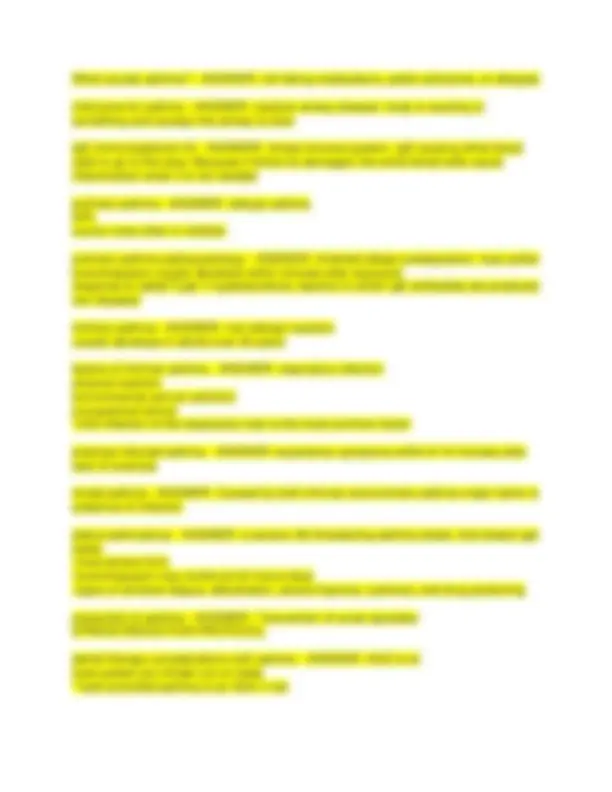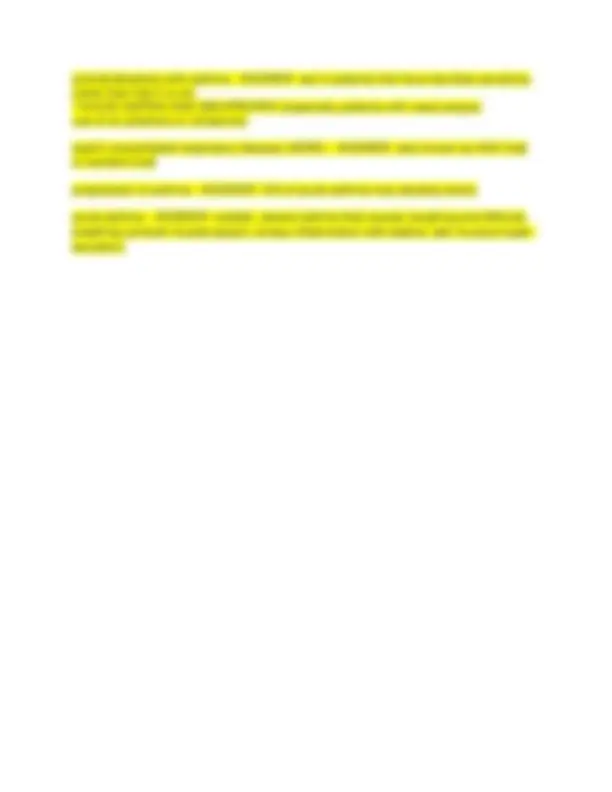




Study with the several resources on Docsity

Earn points by helping other students or get them with a premium plan


Prepare for your exams
Study with the several resources on Docsity

Earn points to download
Earn points by helping other students or get them with a premium plan
Community
Ask the community for help and clear up your study doubts
Discover the best universities in your country according to Docsity users
Free resources
Download our free guides on studying techniques, anxiety management strategies, and thesis advice from Docsity tutors
CMCP EXAM 2 HYPERVENTILATION AND ASTHMA QUESTIONS WITH CORRECT ANSWERS.pdf
Typology: Exams
1 / 4

This page cannot be seen from the preview
Don't miss anything!



predisposing factors of difficulty breathing - ANSWER- hyperventilation vasodepressor syncope asthma hypoglycemia overdose reaction MI Hyperventilation - ANSWER- increased rate and depth of breathing (losing too much CO2) vaspdepressor syncope - ANSWER- passing out anoxia - ANSWER- absence of oxygen apnea - ANSWER- absence of breathing Dyspnea - ANSWER- difficulty breathing Hypoxia - ANSWER- lack of oxygen orthopnea - ANSWER- ability to breathe only in an upright position Tachypnea - ANSWER- rapid breathing chronic respiratory problems - ANSWER- asthma, heart failure predisposing factors of respiratory disorders - ANSWER- STRESS physiological- pain or infection psychological-fear or pain what is due to psychological stress, and are the mot frequent emergency situations in dentistry - ANSWER- hyperventilation and vasodepressor syncope prevention - ANSWER- STRESS REDUCTION PROTOCOL what sounds do asthmatics create - ANSWER- wheezing
heart failure sounds - ANSWER- a cough or other sounds associated with pulmonary congestion Pathophysiology of asthma - ANSWER- bronchi become highly reactive, related to the restricted exchange of O2 and CO2 in lungs primary site of asthma - ANSWER- BRONCHI - terminal bronchioles pathophysiology of heart failure - ANSWER- related to and fluid filling up in the pulmonary veins into the alveolar air sacs pathophysiology of hyperventilation - ANSWER- rapid breathing results in the elimination of an excessive amount of carbon dioxide primary site for hyperventilation - ANSWER- BRAIN hyperventilation is labeled as - ANSWER- more than 28 respirations a minute hyperventialtion most common in ages - ANSWER- 15 - 40 signs and symptoms of hyperventilation - ANSWER- tight chest suffocating feeling lightness of head/ dizziness shortness of breath anxiety high heart rate can go into seizures if.. - ANSWER- if acid base balance is so far out of whack prevntion - ANSWER- STRESS REDUCTION PROTOCOL management of hyperventilation - ANSWER- 1. terminate dental work
contraindications with asthma - ANSWER- epi in patients that have bisulfate sensitivity (other than that it is ok) **AVOID ASPRIN AND IBEUPROFEN (especially patients with nasal polyps) use of air polishers or ultrasonics aspirin exacerbated respiratory disease (AERD) - ANSWER- also known as ASA triad or samters triad progression of asthma - ANSWER- S/S of acute asthma may develop slowly acute asthma - ANSWER- sudden, severe asthma that causes coughing and difficulty breathing (smooth muscle spasm, airway inflammation with edema, adn mucous hyper- secretion)